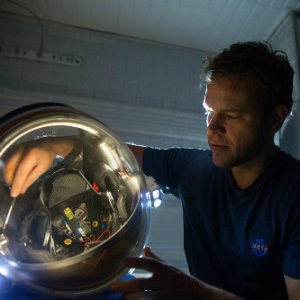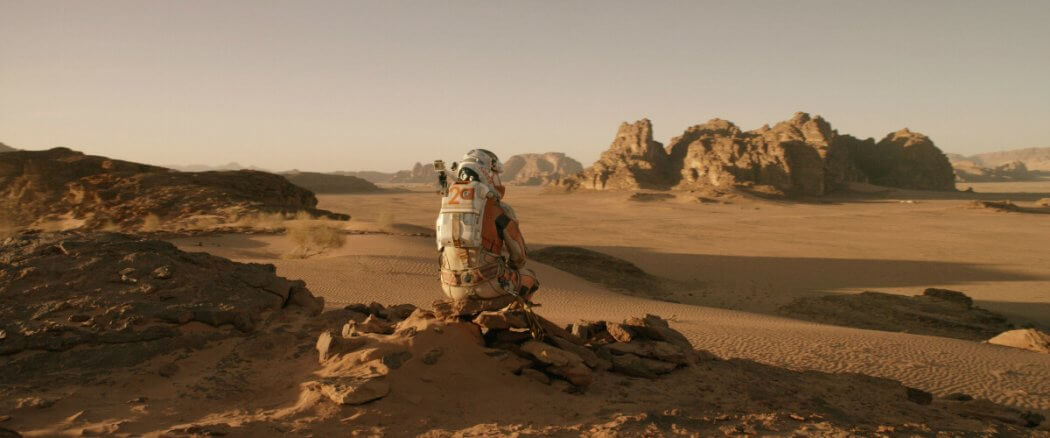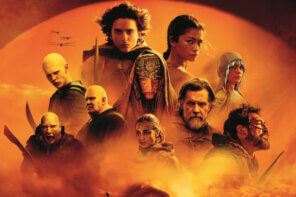Manned missions to Mars are coming! Can you believe that? Humans are going to explore other planets! A mission to Mars is not just science fiction anymore as NASA will most likely send people to Mars sometime in the next 40 years. For some that is exciting (me included) – for others, we can only be thankful that there are not actual living beings on Mars (we think) that would be subject to our explorative and exploitative natures (i.e. Columbus and crew).
Ridley Scott undertakes this scenario of human Mars exploration in the creative and pop-culture laden “The Martian.” Approximately 20 days into the Mars surface exploration a group of astronaut scientists are forced to abort their mission and leave the surface due to a massive dust storm that overtakes their base, but in the struggle to get to the escape ship Matt Damon’s character is swept away. The remaining team manages to get back to their space ship and begin the journey home, believing their friend to be dead.
But he’s not.
Thus the plot begins to unfold. How will NASA rescue one of its prized astronauts and how in the world will Matt Damon stay alive on Mars till they can get to him? By the way – is it just me or does it seem that Damon is getting type-cast a bit into these “I’m trapped on an uninhabitable planet” roles? Nonetheless, being true to the PhD botanist that his character is, most of the film presents Damon as having to “science the shit” out of this situation to stay alive.
My High School Physics Teacher Was Right: Science Is Cool!
I must admit – as one who prides himself in having a pretty good layman’s knowledge of science – some of the science in this film was beyond me. This film, adapted from the book, “The Martian,” took painstaking efforts to get the science right and it shows (except for the final scene that deviated from the book). But there was more to this movie that just science.
 The other striking feature of this film is how it incorporated so much pop-culture into its nearly two and a half hours. The film seems to give credit everywhere, from 80’s video games, to “The Fonz,” to Cast Away (minus Wilson), to Apollo 13, to 2001: A Space Odyssey, to Alien, and on and on – not even to mention the Disco soundtrack. It is chock-full of subtle references.
The other striking feature of this film is how it incorporated so much pop-culture into its nearly two and a half hours. The film seems to give credit everywhere, from 80’s video games, to “The Fonz,” to Cast Away (minus Wilson), to Apollo 13, to 2001: A Space Odyssey, to Alien, and on and on – not even to mention the Disco soundtrack. It is chock-full of subtle references.
Why was this? I have a hunch. For a film about the science of a ten month space ride to Mars (one way) and being stuck on an uninhabitable PLANET, it seemed mind-crushingly boring. Lose-your-mind boring. Ridley Scott tries to make this ride fun, and I don’t blame him. A disco soundtrack is a lot more fun than the reality of the situation, and it worked to some extent for me. But near the end, as Damon began to crack under the unimaginable isolation and intense stress, I was left wanting more. Humans were not created to live in isolation to one another – we are social creatures. The “fun of Mars” took away some of the impact of the effect of isolation upon a person. Instead of the reality of desperation, we are given a series of one-liners to somehow cover up the pain of being left for dead on a planet 50 million miles away.
How Much Is a Life Worth?
From a perspective of a pastor, I had another massive question pounding in my heart all the way through this adventure: How much is one life worth?
As I said, this is not science fiction – this is science fact. Humans are going to Mars and I’m totally okay with that. And what would happen if we left someone there? In this respect, I think Ridley Scott (or should I say the author of the book – Andy Weir) was right on. While the film does not give you a price tag of how much it would cost to try to rescue an astronaut from Mars, your brain begins to imagine.
How much would this rescue effort cost?
I don’t have any idea, but in my limited research it seems like it would be well over a billion dollars. Maybe a few billion.
But it is not just the cost – in typical NASA fashion, it was incredible the amount of human genius that came together to solve problems, to chart solutions and to develop scenarios. Yes, they “scienced” the solutions to seemingly unsolvable problems…all in order to save one life. Yes, an astronaut is an important person and stands for more than simply their own life, and I would completely agree – Matt Damon’s life was worth it (we need another Bourne movie for crying out loud!)
Is Every Life Worth the Same?
If a government agency would be willing to spend a billion dollars and pull together the greatest minds on the planet to solve problems that previously seemed unsolvable – all in the name of exploration and the preservation of life – why can’t we do the same for the kids that show up to our church on Wednesday night for Bible Club? Kids who haven’t eaten all day, have little access to economic prosperity, whose families struggle to put food on the table, whose parents cannot find a living wage job, who are being offered the leftovers of society’s efforts to pursue the American Dream?
What about these kids? How much is their life worth?
 What if we treated their lives like those of astronauts? What if we brought the greatest scientific minds together to solve problems like: access to quality food in the city, quality education for an over-stressed urban educational infrastructure, providing living wage jobs for everyone, everywhere…
What if we treated their lives like those of astronauts? What if we brought the greatest scientific minds together to solve problems like: access to quality food in the city, quality education for an over-stressed urban educational infrastructure, providing living wage jobs for everyone, everywhere…
These seem like unsolvable problems, but so does having someone stuck on Mars, or the real life scenario of Apollo 13. What if we took the greatest scientific minds from around the world and said, “You’ve got some duct tape, a bag of seeds, three meters of parachute cord, 4 zip lock bags, and a community full of eager people-power. Solve the problems. You’ve got 14 hours. Go.”
Astronauts are cool and important, but the kids who come to Bible Club are cool and important too and, given the right opportunities, may be on a manned mission to Mars one day. What if we treated their lives with that sort of potential?
Stayin’ Alive
In the end, I liked The Martian for its science, for the sense of wonder in the human spirit that it left me with, I even liked the soundtrack, but I wanted a bit more. I wanted to experience the depth of human emotion of someone getting left for dead on an abandoned planet with little resources and all the help 50 million miles away. The disco music and one-liners covered up that pain of human exhaustion for me.
When I look at the kids who are living in the neighborhood around me, I see that same human exhaustion, and every time I ask the question, “How much is their life worth?” all I hear is upbeat disco music and one-liners trying to cover up their pain too. Why aren’t the greatest minds on the planet coming together to solve unsolvable solutions for their lives?
Maybe The Martian was more real that I thought.





